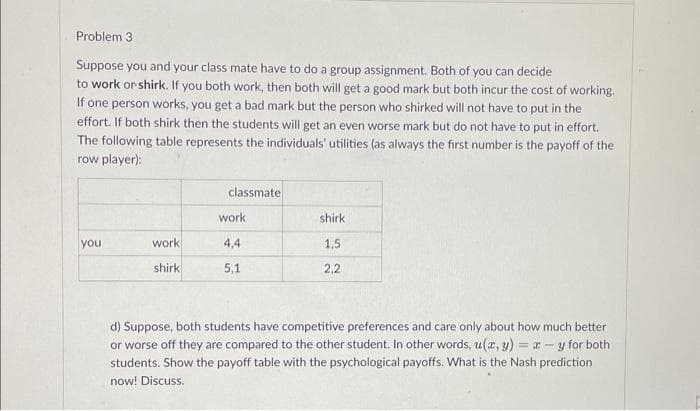Problem 3 Suppose you and your class mate have to do a group assignment. Both of you can decide to work or shirk. If you both work, then both will get a good mark but both incur the cost of working. If one person works, you get a bad mark but the person who shirked will not have to put in the effort. If both shirk then the students will get an even worse mark but do not have to put in effort. The following table represents the individuals' utilities (as always the first number is the payoff of the row player): your work shirk classmate work 4.4 5,1 shirk 1,5 2,2 d) Suppose, both students have competitive preferences and care only about how much better or worse off they are compared to the other student. In other words, u(x, y) = =x-y for both students. Show the payoff table with the psychological payoffs. What is the Nash prediction now! Discuss.
Problem 3 Suppose you and your class mate have to do a group assignment. Both of you can decide to work or shirk. If you both work, then both will get a good mark but both incur the cost of working. If one person works, you get a bad mark but the person who shirked will not have to put in the effort. If both shirk then the students will get an even worse mark but do not have to put in effort. The following table represents the individuals' utilities (as always the first number is the payoff of the row player): your work shirk classmate work 4.4 5,1 shirk 1,5 2,2 d) Suppose, both students have competitive preferences and care only about how much better or worse off they are compared to the other student. In other words, u(x, y) = =x-y for both students. Show the payoff table with the psychological payoffs. What is the Nash prediction now! Discuss.
Principles of Economics (MindTap Course List)
8th Edition
ISBN:9781305585126
Author:N. Gregory Mankiw
Publisher:N. Gregory Mankiw
Chapter17: Oligopoly
Section: Chapter Questions
Problem 5CQQ
Related questions
Question

Transcribed Image Text:Problem 3
Suppose you and your class mate have to do a group assignment. Both of you can decide
to work or shirk. If you both work, then both will get a good mark but both incur the cost of working.
If one person works, you get a bad mark but the person who shirked will not have to put in the
effort. If both shirk then the students will get an even worse mark but do not have to put in effort.
The following table represents the individuals' utilities (as always the first number is the payoff of the
row player):
you
work
shirk
classmate
work
4.4
5,1
shirk
1,5
2,2
d) Suppose, both students have competitive preferences and care only about how much better
or worse off they are compared to the other student. In other words, u(x, y) = IRI
- y for both
students. Show the payoff table with the psychological payoffs. What is the Nash prediction
now! Discuss.
Expert Solution
This question has been solved!
Explore an expertly crafted, step-by-step solution for a thorough understanding of key concepts.
Step by step
Solved in 3 steps

Knowledge Booster
Learn more about
Need a deep-dive on the concept behind this application? Look no further. Learn more about this topic, economics and related others by exploring similar questions and additional content below.Recommended textbooks for you

Principles of Economics (MindTap Course List)
Economics
ISBN:
9781305585126
Author:
N. Gregory Mankiw
Publisher:
Cengage Learning

Principles of Economics, 7th Edition (MindTap Cou…
Economics
ISBN:
9781285165875
Author:
N. Gregory Mankiw
Publisher:
Cengage Learning

Principles of Microeconomics (MindTap Course List)
Economics
ISBN:
9781305971493
Author:
N. Gregory Mankiw
Publisher:
Cengage Learning

Principles of Economics (MindTap Course List)
Economics
ISBN:
9781305585126
Author:
N. Gregory Mankiw
Publisher:
Cengage Learning

Principles of Economics, 7th Edition (MindTap Cou…
Economics
ISBN:
9781285165875
Author:
N. Gregory Mankiw
Publisher:
Cengage Learning

Principles of Microeconomics (MindTap Course List)
Economics
ISBN:
9781305971493
Author:
N. Gregory Mankiw
Publisher:
Cengage Learning

Principles of Microeconomics
Economics
ISBN:
9781305156050
Author:
N. Gregory Mankiw
Publisher:
Cengage Learning


Managerial Economics: A Problem Solving Approach
Economics
ISBN:
9781337106665
Author:
Luke M. Froeb, Brian T. McCann, Michael R. Ward, Mike Shor
Publisher:
Cengage Learning